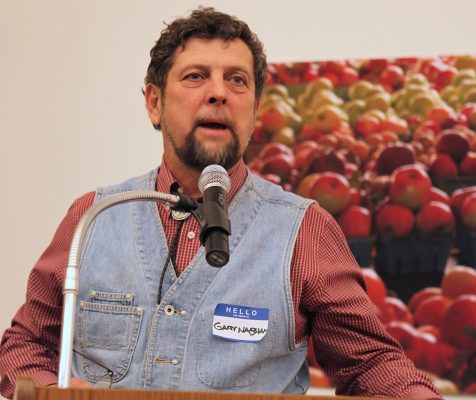Local food pioneer to speak at Cornell
A pioneer of the local food movement will speak at Cornell College on Feb. 20 at 7:30 p.m. in the Hall-Perrine Room of Thomas Commons.

Gary Nabhan ’73 returns to campus to speak on “Food from the Radical Center,” which is the name of his new book. The event is free and open to the public.
The internationally-known author, agricultural ecologist, ethnobotanist, and activist was awarded the MacArthur Foundation “Genius” Grant for his studies of indigenous farming, wild-food gathering, and land management. Prior to this work, Nabhan spent a year and a half on the Hilltop attending classes and working with Cornell biology professor Paul Christiansen, whom Nabhan said was not only one of the best professors he ever had but was one of the best people he’d ever known. As a Cornellian, Nabhan also worked on the first-ever Earth Day in Washington, D.C., in April 1970. He says his time at Cornell set his path for him.
His website tells of his career: Nabhan has an M.S. in plant sciences (horticulture) and a Ph.D. in the interdisciplinary arid lands resource sciences from the University of Arizona. As a student, he started working with, and learning from, farmers and foragers in several indigenous communities on both sides of the U.S. and Mexico border.
Nahban co-founded Native Seeds/SEARCH while working at the University of Arizona, with both organizations co-hosting the first-ever national conference on community-based seed banks and heirloom seed saving. He then served as director of conservation, research, and collections at both the Desert Botanical Garden and Arizona-Sonora Desert Museum, where he did the research to help Secretary Bruce Babbitt create Ironwood Forest National Monument.
He then became founding director of the Center for Sustainable Environments at Northern Arizona University in Flagstaff. In 2008 he moved back south to Tucson and joined the University of Arizona faculty as a research social scientist with the Southwest Center, where he now serves as the Kellogg Endowed Chair in Southwestern Borderlands Food and Water Security. There, he founded the Center for Regional Food Studies and catalyzed the initiative to have UNESCO designate Tucson as the first City of Gastronomy in the U.S.
Tags: environmental studies



